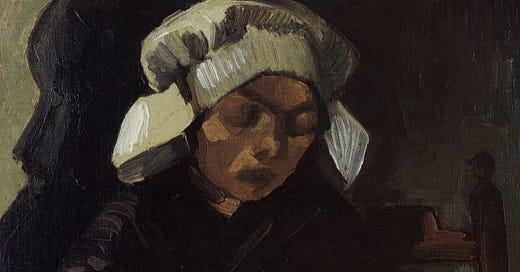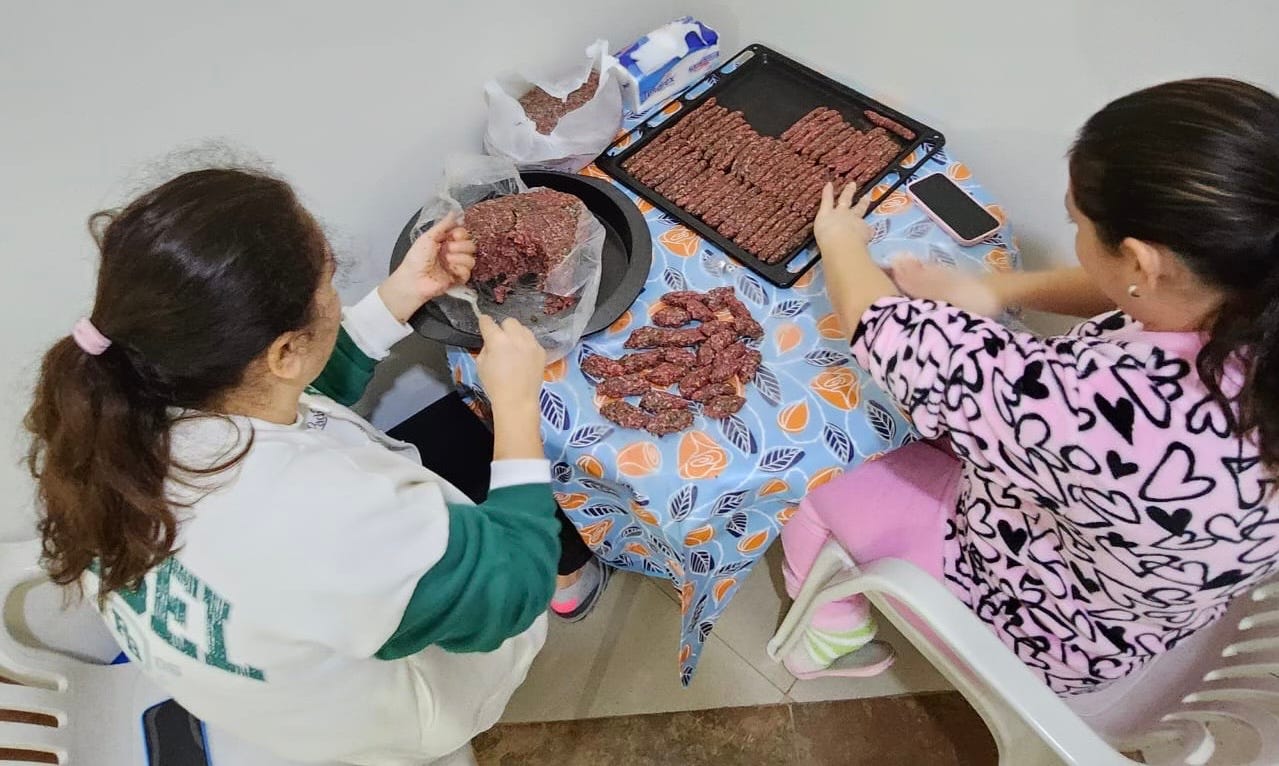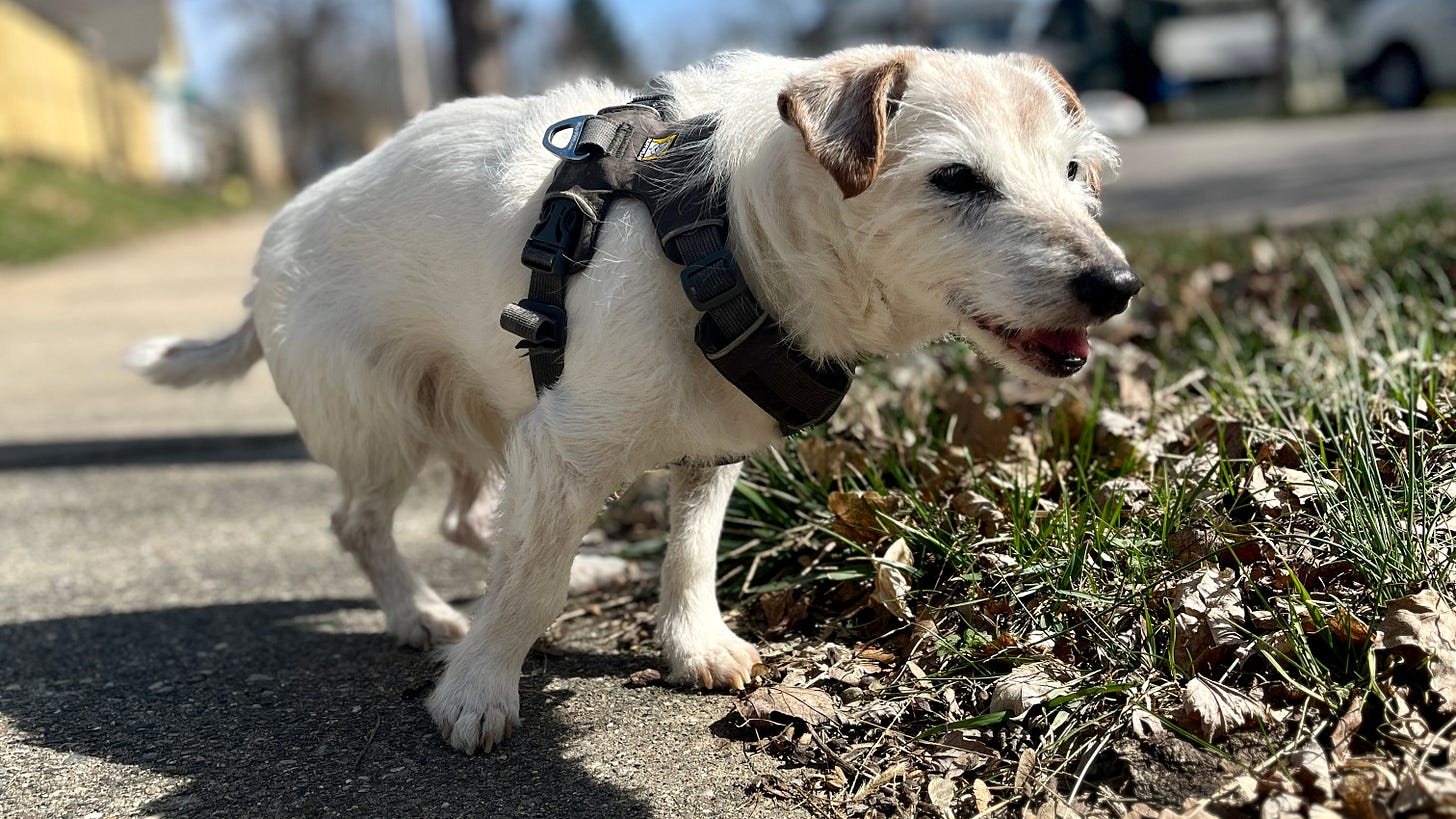Kitchen Stories
Some fragmented thoughts on "The Bear," peeling potatoes, the safe haven of the kitchen, "The Holdovers," and offering solidarity to the suffering in the Middle East
Thursday, March 14
Grand Rapids, Mich.
A couple weeks ago, we started watching “The Bear.”
“You’ll love it!” so many friends told me. “You love to cook.”
It’s an outstanding comedy—in fact, the year’s most outstanding, the Emmys said.
We’re seven episodes in, and I just have to say: Words matter. What do people mean when they say “love”? How does one define “outstanding” and “comedy”?
“The Bear” is very good—and it might be one of the most stress-inducing TV shows I have ever watched. At this point, we plan to keep watching. We’re stubborn. We’ve seen glimpses of goodness. And since my Ph.D. dissertation explores the kitchen as an under-appreciated space of holy transformation, I’ll call it “research.”
While in recovery from the most recent episode, I thought about how I’ve always loved being in kitchens—at family gatherings and at other people’s parties, you’re far likelier to find me over a cutting board or at the stove than anywhere else. I’ve only had one extended experience in a professional kitchen, though. I was then a young journalist at Time in London, and if I’d worked on Saturday, helping to close that week’s magazine, I’d usually have Mondays off. So, for a few years, I went to a homeless shelter most Monday afternoons, to help prepare dinner for the guests.
The charity that ran the shelter was Christian; Nour, the chef I worked for, was Muslim, from Kenya. He had a quick wit, a sweet spirit, and a cheeky grin. This kitchen was almost exactly the opposite of what you see in “The Bear“—quiet, even serene. Really, the main similarity with the show, aside from the commercial-grade equipment, was that Nour adored the word “fuck” in pretty much every form.
Most Mondays, my job was to peel pounds and pounds of potatoes. This was England. No matter what else was on the menu, there were always potatoes.
My very first Monday, Nour watched me select a swivel peeler, which is what we’d had at home when I was a kid, and then slowly work through the pile, peels flying everywhere. The following week, when I picked that same peeler up, he sighed, shook his head, and handed me a Y-shaped one instead. “Try this,” he said. As I painstakingly made my way around my potato, he took a paring knife and picked up another one. In seconds, he’d liberated it from the skin, which hung from his hand in a single, elegant spiral. “Or like this,” he said.
Yes, chef.
Every Monday, it was just Nour and me in the kitchen, and I came to cherish those hours. At the office, I felt I had to prove myself constantly. At home, I was alone with my own depressed self. But there in the kitchen, focused on the potatoes, I felt freer than anywhere else.
If I walked in and Nour grunted at me, I’d know he’d been out late the previous evening. “Rough night?” I’d say. Another grunt would provide confirmation. But occasionally, he’d smile and regale me with tales of his after-dark shenanigans; I’d blush, like the good Christian boy I was supposed to be, and he’d laugh, delighted in his ability to scandalize me. And if I’d been away because of vacation or work, I knew Nour would greet my return with a profanity-laden litany of complaint about leaving him helpless, all delivered with a smirk.
Often we’d just work in companionable silence. Other times, he’d tell me about Kenya, and the food he grew up eating, and the coast and its beauty. Occasionally, we discussed spirituality. Nour regularly confessed to me that he thought of himself as a terrible Muslim. He drank alcohol, and of course there were his late-night shenanigans. Yet every year, when Ramadan rolled around, he’d fast. “Are you fasting?” I remember asking him. He’d wave the question away and mutter, “Yes, yes,” and I’d notice that, during those weeks, he never tasted the food, and his usual container of water was missing from the counter. (Ramadan mubarak to all who observe, by the way. May your fast bless you and nourish your soul.)
Nour wasn’t a strict taskmaster. Both he and I knew that he didn’t really need me. I suspect, though, that he also sensed something else: I wasn’t just there as a volunteer. I was also, in my own way, seeking shelter.
He rarely asked me anything personal. He often liked to hear about different parts of the United States: What is New York City like? San Francisco? Los Angeles? Once, though, maybe a year or so into my time there, he surprised me by asking whether I had a girlfriend. “No,” I said. I didn’t say any more than that—couldn’t, really. I couldn’t even admit to myself that I was gay or depressed; how could I tell him?
He turned back to the stove, and I got on with peeling more potatoes. After a couple of minutes, he swung back around and said, “Just be you. I think that is all that matters. Just be you.”
What Else I’m Watching: The night before the Oscars, I managed to get one nominated film in—the only one of the year, actually. We watched “The Holdovers,” a sweet, funny, melancholy story about a boarding school and those who stay behind after everyone else goes home for Christmas. Da’Vine Joy Randolph truly is stellar in this film, as Mary Lamb, a grieving mom who is also the school’s cook; she deserved the Oscar she won, for Best Supporting Actress.
“I find the world a bitter and complicated place, and it seems to feel the same way about me. I think you and I have this in common,” Paul Hunham, a high-school classics teacher played by Paul Giamatti, says to his student Angus Tully, played by Dominic Sessa. I felt such a sense of recognition! I wanted to say, “Me too!” Really, The Holdovers is about the sorrows that so many of us carry—and finding one another, extending solidarity, and maybe even sharing a little hope in the midst of it all.
If you haven’t seen The Holdovers, I highly recommend it. It’s streaming on Peacock.
Last week, I spent some time on Zoom with the Rev. Linda Macktaby, a pastor in Beirut, Lebanon. She’s a trailblazer and a force: just the second woman ever ordained as a minister in her denomination, the National Evangelical Church of Beirut (“similar to Presbyterian,” she said); only the fourth ordained woman in Lebanon; and the chair of an interfaith clergy committee for a nonprofit called Adyan (“the others are all males—sheiks and priests—and I am their boss!”). Prior to being ordained, she worked for years as the director of the Blessed School, which serves the disabled—some blind, some with autism, some with Down’s syndrome. In Lebanon, the disabled are often institutionalized. The school teaches them life skills, provides jobs, and offers housing and all manner of necessary support.
The main reason for our conversation, though, wasn’t to talk about her remarkable resume. I wanted to discuss the work that is consuming her time, energy, and effort: aiding the Lebanese who have been affected by the spillover of Israel’s war on Gaza.
In the wake of Hamas’s October 7th attacks on Israel, the Lebanese militant group Hezbollah, which is allied with Hamas, has launched rockets on northern Israel nearly every day; Israel has replied with shelling and airstrikes. While Israel’s calamitous invasion of Gaza and the ensuing humanitarian catastrophe have rightly received more attention, hundreds of people have also been killed in Lebanon, houses and churches destroyed, and some 100,000 people displaced from their homes. “We are worried,” Macktaby told me. “Most of the south of Lebanon is being bombed. We live every day not knowing what will happen the next. Will we be another Gaza?”

The people’s plight has been compounded by a five-year-long economic and political crisis in Lebanon. Inflation has soared into the triple digits. Even in relatively secure parts of the country, jobs are scarce. “People were already suffering. Now they are suffering even more,” Macktaby said. “The need is really big.”
Macktaby is helping to supply necessities to 1,100 refugees who have taken shelter in three schools in the city of Tyre, on the Mediterranean coast. Classrooms have been turned into living quarters, with three or four families sharing each. Some days, she and her team put together packages of ready-to-eat food, because the refugees can’t cook in the schools, as well as medicine, hygiene products, and diapers. Some days, that means making 1,100 sandwiches with a rare treat: meat. “NGOs that send food, it’s mainly beans,” she said. “It’s important not to feed them only beans.”
With a network of local religious leaders, she also delivers food and supplies to 1,400 families who have chosen not to leave their homes in southern Lebanon. “These are risky areas, and many major NGOs are afraid to send people there,” she said. “I work with the sheiks and the priests. Last week, a doctor came from a village and took eighty bags of food back.” Macktaby always tries to tuck some candies into the bags destined for families with kids: “Now sweets are a privilege.”
She has tried to get friends living in the south to move to Beirut’s relative safety. “But they tell themselves a story: We’re fine. The bombing is far away,” Macktaby said. “One of my friends lives in Qana, where Jesus did his first miracle. She feels she belongs there. She cannot explain it. It’s in her heart. She keeps giving me excuses: Oh, the bombing was twenty minutes away or twenty-six minutes away.” Qana is less than eight miles from the Lebanon-Israel border. “I always tell her, ‘You’re crazy.’ But she wants to be near her family.”
Hezbollah has said that it will halt its attacks on Israel if and when a ceasefire happens in Gaza. But Israeli defense minister Yoav Gallant said two weeks ago that even if a ceasefire were agreed for Gaza, it wouldn’t apply to Lebanon. “We will continue the fire,” he said, “until we achieve our goals.”
Macktaby grieves such rhetoric. “I just dream of having leaders who would seek real peace around the world. Can we have leaders who we can talk about in a positive way—religious leaders, political leaders, social and economic leaders?” she said. “This is about humans. This is about souls. I pray that God would be present in the hearts of every single person. But we know many are refusing. We don’t know how to love, and we don’t know how to live in peace.”
There are ultimately no winners in war. And even if peace comes soon, Macktaby, who has a degree in psychology, believes that so much work will remain to be done: “After war is finished, we will have another catastrophe, because the language is different now. We will need conflict resolution and peace-building. We will need to change the terms—and not just the terms but also the tongues of the kids who are witnessing war now. Because this is the language that they are learning.”
I’m so thankful for the witness and the work of Macktaby and those who are laboring alongside her. But again, I have to ask, how long, O Lord?
Please consider making a gift to support the Rev. Linda Macktaby’s relief efforts in Lebanon. Ahead of my ordination on April 6th, a couple of friends have asked what an appropriate gift would be. I don’t want or need anything. But I’d be grateful and honored if you were to join me in helping Macktaby. I also recognize that, in the absence of a ceasefire, the humanitarian crisis in Gaza continues to worsen. So alternatively, consider a donation to the Middle East Children’s Alliance, which is providing relief in Gaza, or to the Ahli Arab Hospital, which is still operating in Gaza despite the dire circumstances.
Our average high temperatures in March in Grand Rapids? 44 degrees Fahrenheit. Yesterday’s high? 69. Yikes. It has been beautiful, and it is also terrible. Fozzie, at least, is enjoying the warmer weather. Your weekly proof of life:
A reminder: I’ll be in Southern California this weekend, preaching at the First Presbyterian Church of Santa Monica. Worship begins at 10 a.m. PT, both in the sanctuary and on YouTube.
As always, I’d love to hear what this week’s letter stirs in you or if you have anything you’d like me to remember in my prayers.
Yours,
Jeff







Your description of the kitchen really struck a chord with me-- I recently started volunteering in the kitchen for my church's homeless ministry, and not only does it do a lot of tangible good for our neighbors, but it's exceptional at quieting my mind. I'll show up with my head buzzing with all my worries, but once I settle in chopping veggies and plating desserts and doing dishes, I get out of my head for a while and just fall into the flow of work.
As the newbie on our church soup kitchen ministry, I was given the job of making peanut butter and jelly sandwiches. Apparently, that is the lowest job on the totem pole - and the men are always the ones doing the grilling and stove duties (don't get me started...). I'm not the newbie anymore, but I'm still proudly the "sandwich queen." It's quiet at the sandwich table and easy to talk to whatever partner I'm given. All that spreading is meditative to me. Plus, who doesn't love a sandwich?
And... thanks for the ideas for giving in the Middle East. The need is overwhelming and sometimes it's hard to sort through the noise to figure out how to help from way over here.
PS - Hi Fozzie!! xoxo